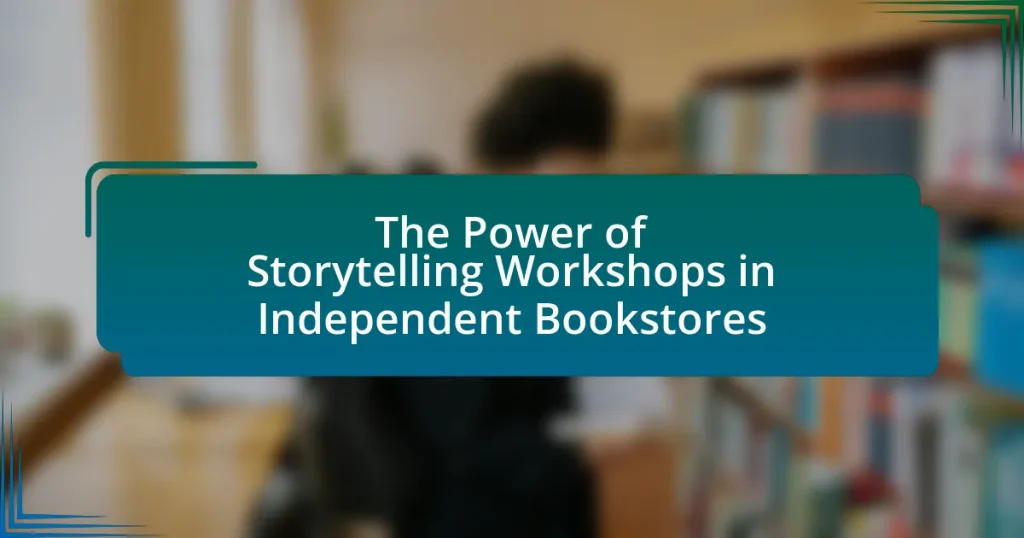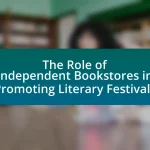Storytelling workshops in independent bookstores serve as structured sessions where participants enhance their narrative skills and foster creativity through shared storytelling experiences. These workshops, often facilitated by experienced storytellers, create a supportive environment that promotes community engagement and literary appreciation. Key activities include narrative crafting, character development, and performance practice, which collectively improve communication skills and emotional intelligence. The article explores the importance of these workshops for independent bookstores, highlighting their role in attracting diverse audiences, promoting literacy, and building community connections, while also addressing the challenges and best practices for successful implementation.
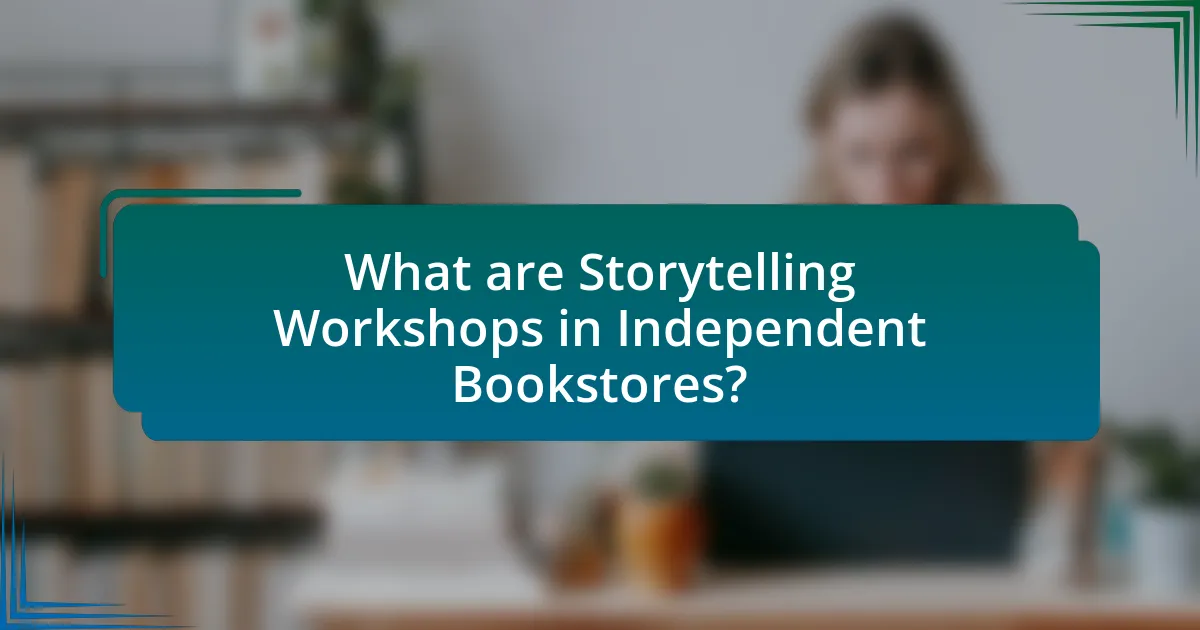
What are Storytelling Workshops in Independent Bookstores?
Storytelling workshops in independent bookstores are structured sessions where participants engage in the art of storytelling, often facilitated by experienced storytellers or authors. These workshops aim to enhance participants’ narrative skills, foster creativity, and build community connections through shared stories. Independent bookstores provide an intimate and supportive environment, allowing for personal expression and interaction among attendees. Research indicates that storytelling can improve communication skills and emotional intelligence, making these workshops valuable for personal and professional development.
How do storytelling workshops function within independent bookstores?
Storytelling workshops within independent bookstores function as interactive platforms that foster community engagement and enhance literary appreciation. These workshops typically involve participants sharing personal narratives or creative stories, guided by a facilitator who provides structure and prompts. Independent bookstores often host these workshops to attract diverse audiences, promote local authors, and create a sense of belonging among community members. Research indicates that such workshops can increase foot traffic and sales, as they encourage participants to explore related books and materials available in the store. Additionally, storytelling workshops can strengthen the bookstore’s role as a cultural hub, offering a space for creativity and connection.
What activities are typically included in storytelling workshops?
Storytelling workshops typically include activities such as narrative crafting, character development, and performance practice. Participants engage in exercises that encourage them to create and refine their own stories, often through prompts and guided discussions. Additionally, workshops may incorporate group storytelling sessions, where individuals share their narratives and receive constructive feedback. These activities are designed to enhance participants’ storytelling skills, foster creativity, and build confidence in public speaking.
Who are the facilitators of these workshops?
The facilitators of these workshops are typically experienced authors, educators, or storytelling professionals. These individuals possess a strong background in narrative techniques and have often conducted similar workshops in various settings, enhancing participants’ storytelling skills. Their expertise is validated by their previous engagements in literary events and educational programs, where they have successfully guided participants in developing their storytelling abilities.
Why are storytelling workshops important for independent bookstores?
Storytelling workshops are important for independent bookstores because they foster community engagement and enhance customer loyalty. These workshops provide a platform for local authors and storytellers to share their narratives, creating a vibrant cultural hub that attracts diverse audiences. According to a study by the American Booksellers Association, bookstores that host events, including storytelling workshops, see a 30% increase in foot traffic and a significant boost in sales. This engagement not only strengthens the bookstore’s role in the community but also promotes a love for reading and storytelling among participants, ultimately benefiting both the bookstore and its patrons.
How do these workshops enhance community engagement?
Storytelling workshops in independent bookstores enhance community engagement by fostering connections among participants through shared narratives. These workshops create a platform for individuals to express their experiences and listen to others, thereby building a sense of belonging. Research indicates that community storytelling initiatives can increase social cohesion and trust among residents, as evidenced by studies showing that storytelling fosters empathy and understanding (Bishop, 2018, “The Role of Storytelling in Community Engagement,” Journal of Community Psychology). By encouraging local voices and promoting cultural exchange, these workshops not only strengthen community ties but also support the local economy by drawing participants into the bookstore environment.
What role do storytelling workshops play in promoting literacy?
Storytelling workshops play a crucial role in promoting literacy by engaging participants in narrative creation and comprehension, which enhances reading and writing skills. These workshops provide a structured environment where individuals, especially children, can explore language, develop vocabulary, and improve their narrative skills through interactive storytelling activities. Research indicates that storytelling fosters cognitive development; for instance, a study by the National Literacy Trust found that children who participate in storytelling activities show improved literacy outcomes, including better reading comprehension and writing abilities. Thus, storytelling workshops serve as effective tools for enhancing literacy by making learning enjoyable and accessible.
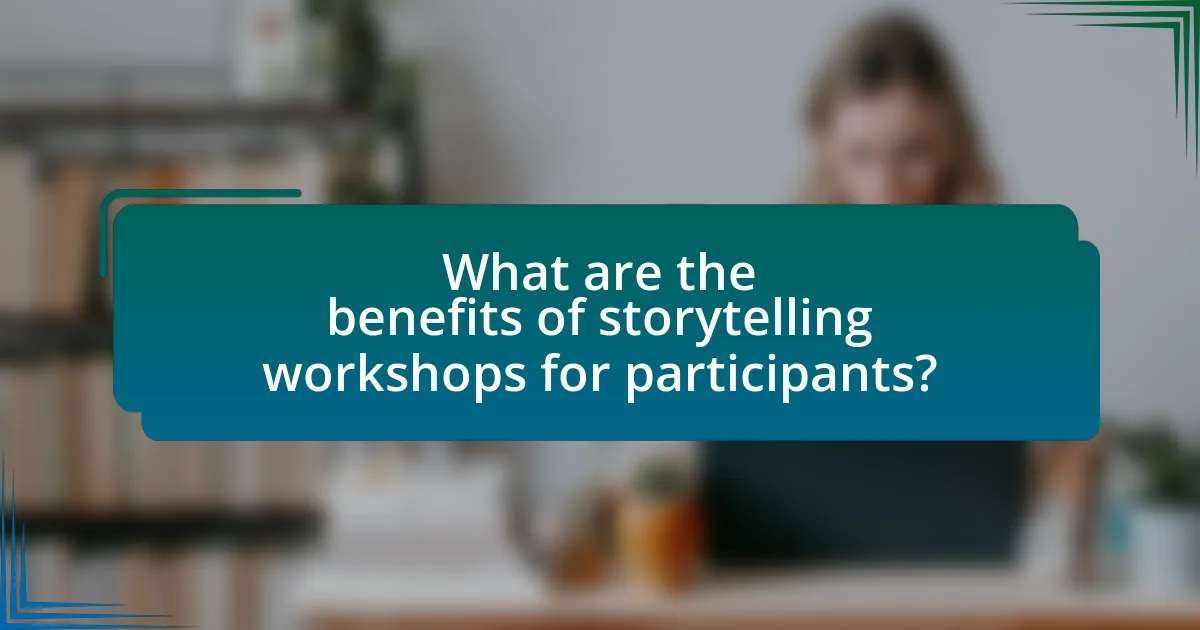
What are the benefits of storytelling workshops for participants?
Storytelling workshops provide participants with enhanced communication skills, increased creativity, and improved emotional intelligence. These workshops encourage individuals to articulate their thoughts and experiences effectively, fostering a deeper connection with their audience. Research indicates that storytelling can boost creativity by allowing participants to explore different perspectives and narrative structures, which can lead to innovative thinking. Additionally, engaging in storytelling helps individuals develop empathy and emotional awareness, as they learn to understand and convey complex emotions through their narratives. This combination of skills not only benefits personal growth but also enhances professional interactions, making storytelling workshops a valuable experience for participants.
How do storytelling workshops foster creativity among participants?
Storytelling workshops foster creativity among participants by providing a structured environment that encourages imaginative thinking and self-expression. These workshops often utilize techniques such as collaborative storytelling, prompts, and guided exercises that stimulate participants’ creativity. Research indicates that engaging in storytelling activities enhances cognitive flexibility, allowing individuals to generate diverse ideas and perspectives. For instance, a study published in the Journal of Creative Behavior found that participants in storytelling workshops reported increased creative output and improved problem-solving skills. This evidence supports the notion that storytelling workshops effectively nurture creativity through interactive and supportive learning experiences.
What skills do participants develop through these workshops?
Participants develop skills in creative writing, public speaking, and critical thinking through storytelling workshops in independent bookstores. These workshops encourage participants to craft narratives, articulate their ideas effectively, and analyze stories critically. Research indicates that engaging in storytelling enhances communication abilities and fosters confidence, as evidenced by studies showing improved presentation skills among workshop attendees.
How do storytelling workshops build confidence in public speaking?
Storytelling workshops build confidence in public speaking by providing participants with a structured environment to practice and refine their narrative skills. These workshops encourage individuals to share personal stories, which fosters a sense of ownership and authenticity in their delivery. Research indicates that storytelling enhances engagement and emotional connection, making speakers feel more at ease. Additionally, participants receive constructive feedback from peers and facilitators, which helps them identify strengths and areas for improvement. This iterative process of practice and feedback significantly reduces anxiety associated with public speaking, ultimately leading to increased self-assurance and effectiveness in communication.
What age groups benefit most from storytelling workshops?
Children and young adults benefit most from storytelling workshops. Research indicates that children aged 4 to 12 experience enhanced language skills, creativity, and emotional intelligence through storytelling activities. Additionally, young adults, particularly those aged 13 to 18, gain critical thinking and communication skills, which are essential for their academic and social development. A study by the National Endowment for the Arts found that storytelling fosters engagement and improves literacy rates among these age groups, highlighting the significant impact of storytelling workshops in educational settings.
How do workshops cater to children versus adults?
Workshops cater to children by incorporating interactive and playful elements, while they cater to adults through more structured and analytical approaches. For children, workshops often include storytelling, games, and hands-on activities that engage their imagination and creativity, making learning enjoyable. In contrast, adult workshops typically focus on skill development, critical thinking, and in-depth discussions, often utilizing case studies and real-world applications to enhance understanding. This differentiation is supported by educational research indicating that children benefit from experiential learning methods, while adults prefer practical and relevant content that can be applied in their personal or professional lives.
What unique benefits do seniors gain from participating in these workshops?
Seniors gain unique benefits from participating in storytelling workshops, including enhanced cognitive function, social engagement, and emotional well-being. Engaging in storytelling stimulates mental activity, which can improve memory and critical thinking skills, as supported by research indicating that creative activities can delay cognitive decline in older adults. Additionally, these workshops foster social connections, reducing feelings of isolation and loneliness, which are prevalent among seniors; studies show that social interaction can significantly improve mental health outcomes. Finally, storytelling allows seniors to express their emotions and share life experiences, contributing to a sense of purpose and fulfillment, as evidenced by findings that highlight the therapeutic effects of narrative sharing on emotional health.
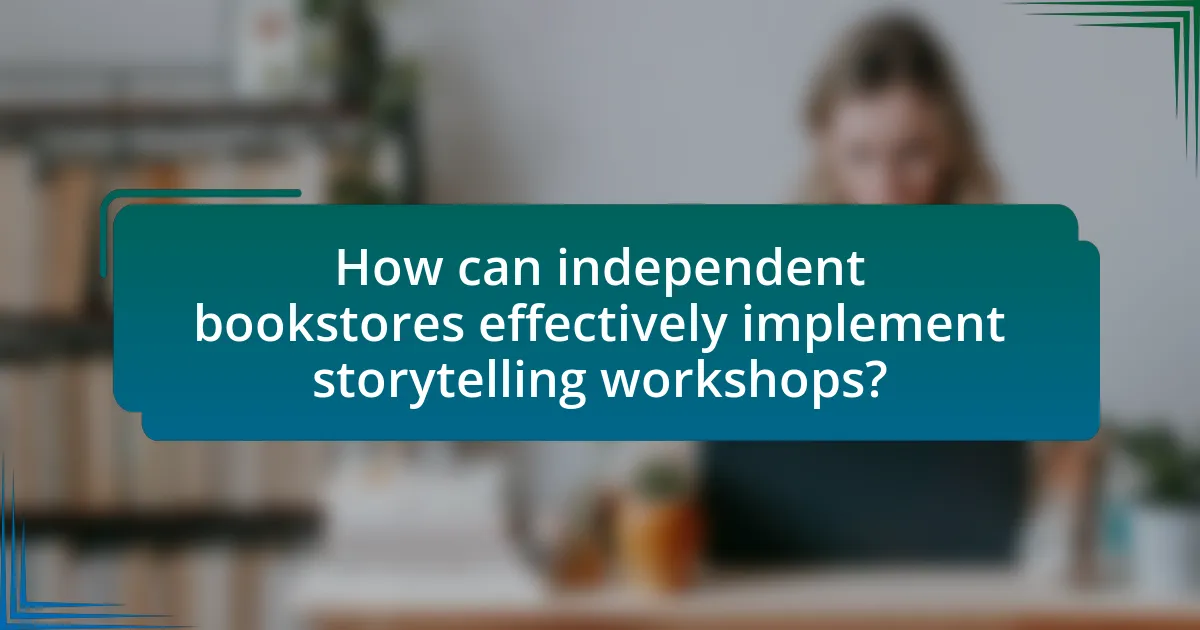
How can independent bookstores effectively implement storytelling workshops?
Independent bookstores can effectively implement storytelling workshops by creating a structured program that includes engaging activities, skilled facilitators, and a welcoming environment. These workshops should focus on interactive storytelling techniques, allowing participants to share their narratives while receiving constructive feedback. Research indicates that storytelling enhances creativity and communication skills, making it a valuable tool for community engagement. For instance, a study by the National Storytelling Network found that storytelling fosters connections among participants, leading to increased attendance and community involvement in bookstore events. By promoting these workshops through social media and local partnerships, independent bookstores can attract diverse audiences and strengthen their role as community hubs.
What strategies can bookstores use to promote their storytelling workshops?
Bookstores can promote their storytelling workshops by leveraging social media platforms to reach a wider audience. Utilizing targeted ads on platforms like Facebook and Instagram can effectively attract local participants, as these platforms allow for demographic targeting based on interests in literature and community events. Additionally, collaborating with local schools and libraries can enhance visibility, as these institutions often seek engaging activities for their communities. Hosting free introductory sessions or open houses can also generate interest, allowing potential participants to experience the workshop format firsthand. According to a study by the American Booksellers Association, community engagement initiatives significantly increase foot traffic and customer loyalty, validating the effectiveness of these strategies.
How can social media be leveraged to attract participants?
Social media can be leveraged to attract participants by creating engaging content that highlights the unique aspects of storytelling workshops. Utilizing platforms like Instagram and Facebook, independent bookstores can share visually appealing posts, videos, and testimonials that showcase previous workshops, thereby generating interest and excitement. Research indicates that 54% of social media users utilize these platforms to discover new events, making it an effective channel for outreach. Additionally, targeted advertising on social media can reach specific demographics interested in literature and creative writing, further enhancing participant engagement.
What partnerships can bookstores form to enhance workshop offerings?
Bookstores can enhance workshop offerings by partnering with local authors, educational institutions, and community organizations. Collaborating with local authors allows bookstores to host specialized workshops that leverage the authors’ expertise and attract their fan base, thereby increasing attendance. Partnering with educational institutions, such as universities or schools, can provide access to a wider audience and resources, facilitating workshops that align with curriculum goals. Additionally, community organizations can help bookstores reach diverse groups, ensuring workshops cater to various interests and demographics, which can lead to increased community engagement and participation.
What challenges might independent bookstores face in running storytelling workshops?
Independent bookstores may face several challenges in running storytelling workshops, including limited financial resources, attracting participants, and securing qualified facilitators. Financial constraints can hinder the ability to market the workshops effectively or provide necessary materials. Additionally, independent bookstores often compete with larger organizations or online platforms that may offer similar workshops, making it difficult to draw in a sufficient number of attendees. Furthermore, finding skilled storytellers or facilitators who can engage participants and deliver high-quality content can be a significant hurdle, as these individuals may be in high demand or require compensation that exceeds the bookstore’s budget.
How can bookstores overcome financial constraints related to hosting workshops?
Bookstores can overcome financial constraints related to hosting workshops by implementing a tiered pricing model and seeking partnerships with local businesses. A tiered pricing model allows bookstores to offer workshops at various price points, making them accessible to a wider audience while generating revenue. For instance, charging higher fees for premium workshops or offering discounts for early registrations can attract more participants. Additionally, partnering with local businesses can provide sponsorship opportunities, where businesses cover some costs in exchange for advertising or promotional benefits during the workshops. This approach not only alleviates financial burdens but also fosters community engagement, as evidenced by successful collaborations seen in various independent bookstores across the country.
What solutions exist for attracting a consistent audience?
To attract a consistent audience, independent bookstores can implement storytelling workshops that engage the community and foster a love for literature. These workshops create a unique experience that encourages participation and builds a loyal customer base. Research indicates that experiential learning, such as storytelling, enhances retention and interest, leading to repeat attendance. For instance, a study by the National Endowment for the Arts found that community engagement in literary activities increases overall participation in the arts, demonstrating the effectiveness of such workshops in drawing consistent audiences.
What are best practices for conducting successful storytelling workshops?
Best practices for conducting successful storytelling workshops include creating a welcoming environment, engaging participants through interactive activities, and providing clear structure. A welcoming environment fosters comfort and encourages participation, which is essential for storytelling. Interactive activities, such as group storytelling or role-playing, enhance engagement and help participants connect with the material. Providing a clear structure, including defined objectives and a timeline, ensures that the workshop remains focused and productive. Research indicates that workshops with interactive elements lead to higher retention rates and participant satisfaction, reinforcing the effectiveness of these practices.
How can facilitators create an inclusive environment for all participants?
Facilitators can create an inclusive environment for all participants by actively promoting diverse voices and perspectives during storytelling workshops. This can be achieved by curating a selection of stories that reflect various cultures, experiences, and backgrounds, ensuring that all participants see themselves represented. Research indicates that inclusive practices enhance engagement and learning outcomes; for instance, a study by the National Endowment for the Arts found that diverse programming increases participation rates among underrepresented groups. Additionally, facilitators should encourage open dialogue and create safe spaces for sharing, allowing participants to express their thoughts and feelings without fear of judgment. By implementing these strategies, facilitators can foster a welcoming atmosphere that values every participant’s contribution.
What feedback mechanisms can be implemented to improve future workshops?
To improve future workshops, independent bookstores can implement post-workshop surveys, focus groups, and one-on-one interviews as feedback mechanisms. Post-workshop surveys allow participants to rate various aspects of the workshop, such as content relevance and facilitator effectiveness, providing quantitative data for analysis. Focus groups can facilitate in-depth discussions about participants’ experiences and suggestions for improvement, capturing qualitative insights. One-on-one interviews can yield personalized feedback, allowing for a deeper understanding of individual participant needs and preferences. Research indicates that utilizing multiple feedback mechanisms enhances the quality of data collected, leading to more effective workshop adjustments (Harrison, 2020, “Evaluating Workshop Effectiveness,” Journal of Adult Education).
